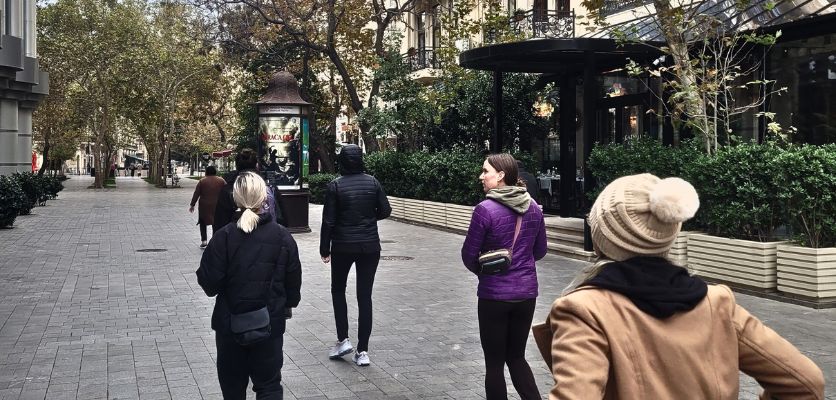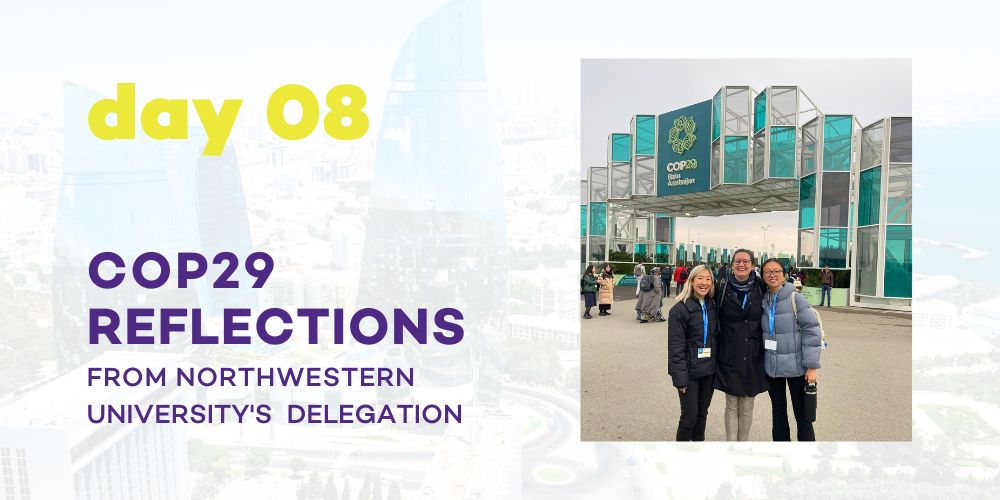Reflections from Northwestern University's COP29 Delegation: Day 8
For a fourth year, a delegation of Northwestern University students and faculty supported by the Buffett Institute is among more than 30,000 researchers, policymakers, industry leaders and activists at the world’s largest annual international treaty negotiations and climate summit, the 29th Conference of Parties (COP29) to the United Nations Framework Convention on Climate Change (UNFCCC), this year hosted in Baku, Azerbaijan. Each day, a different Northwestern delegate is blogging about their experiences and reflections. Day 8 features Siyuan Feng, a fourth-year MD/PhD candidate in the Feinberg School of Medicine and the Department of Biomedical Engineering.
I’m an engineer. I like to think about bioengineering questions, love a technical challenge and find few things more rewarding than making something new. At COP29, I’ve been following conversations around technology innovation and capacity-building, buzzwords related to how new technologies are developed and how communities can acquire the necessary skills to use such technologies. Many of the COP29 sessions I’ve attended have highlighted the importance of tech innovation to address climate change, the role of capacity-building for effective implementation and the need to equip youth with green skills. As a 24-year-old student specifically training to develop environment-related technologies, these discussions feel strangely personal—like they’re talking about me! My work and training feel important.
At the same time, however, I have noticed a subtle tension in some rooms where innovation takes center stage. One of my favorite sessions at COP29 was a debate on skills-building for climate action. Someone there described how an ‘obsession’ over skills-building can be detrimental, referencing how the imposition of skills on Indigenous communities has historically done little to improve lives while generating long-lasting harm. Someone else highlighted how focusing on skills-building can overshadow the need for infrastructure development: what good are new skills if people lack the socioeconomic environment to apply them? A third person made a compelling argument that, beyond innovation or skills, what climate action desperately needs is collective courage. These are not issues that I, or my field, study.
But, while in Baku, I have learned tremendously from Diana, Michelle, Cate, Danielle and Sam, who are all in the social sciences. I am constantly humbled by how they strike up intellectual conversations with strangers, notice architectural and social nuances, unpack rhetoric and communicate intricate social and economic concepts. I am amazed by the research they are pursuing (which I’ll let them tell you about) and by how they conceptualize meaningful and just climate solutions. Their work addresses the questions that my engineering toolbox cannot and does not reach.

Five members of Northwestern’s delegation to COP29, all social scientists
I still think engineering work is important. But, from attending COP29, I am also increasingly convinced that cross-disciplinary integration is a non-negotiable to solving societal challenges like climate change. And, in a strange but appropriate way, I am getting to do a little of that here in Baku—a metaphorical ‘having my cake and eating it too.’ I am so grateful this week to be working with and surrounded by individuals who care so much about the world; who leverage approaches in education, history, political theory, sociology and international relations; and to be in a space that both calls for and enables this kind of cross-disciplinary reality.
It’s a gift to be at COP29 with five brilliant social scientists. I can’t wait to see what we can accomplish together.

Siyuan, or Juliana, Feng is a fourth-year MD/PhD candidate in the Feinberg School of Medicine and the Department of Biomedical Engineering at the McCormick School of Engineering at Northwestern University. She is also a member of Northwestern’s Lucks Lab. Her research focuses on the development of affordable, point-of-need technologies to detect contaminants in water. At COP29, Siyuan is interested in the processes that govern technology innovation and transfer to low- and middle-income countries.

